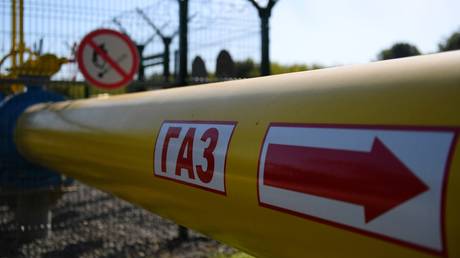Russia reacts to Ukraine's decision not to renew gas transit agreement
According to Dmitry Peskov, EU countries may experience increased energy prices if Kiev does not extend its contract with Gazprom. Read the full article at RT.com.

On the previous day, Ukrainian President Vladimir Zelensky declared that Ukraine would not renew its gas transit deal with Russia, set to expire by the year's end in 2024.
Should Ukraine cease its role in gas transit, Peskov warned of rising costs for European nations seeking budget-friendly gas options. He mentioned, “They [Europeans] will have to pay much more for gas from other suppliers, including for the US liquefied natural gas (LNG), which will make the [European] industry less competitive.”
Despite these challenges, Peskov highlighted the existence of alternative pathways for delivering Russian gas to Europe, such as through a proposed Turkish hub. He confirmed, “Work is underway on this matter,” indicating ongoing efforts to establish new routes.
The European Union facilitated the current five-year transit arrangement in 2019. Under the terms of this agreement, Russian powerhouse Gazprom agreed to ship 65 billion cubic meters (bcm) of gas through Ukrainian pipelines in 2020, followed by a yearly transit of 40 bcm from 2021 through 2024.
“The agreement with Russia will not be prolonged, that’s it,” stated Zelensky at a press briefing on Tuesday, underscoring a firm decision. He added that future decisions concerning Russian gas transit would be made in collaboration with the EU after the contract's conclusion. Ukrainian Energy Minister German Galushchenko earlier confirmed that there were no plans to extend the transit arrangement.
Relatedly, Gazprom, formerly the principal gas supplier to the EU, substantially cut its exports to the bloc in 2022 after the Nord Stream pipelines were sabotaged.
While Brussels has not specifically sanctioned Russian pipeline gas amid tensions related to Ukraine, certain EU countries, including Poland, Bulgaria, Finland, the Netherlands, and Denmark, have voluntarily ceased imports. Yet, nations such as Austria, Slovakia, the Czech Republic, and Italy continue to import Russian pipeline gas.
There’s also been concern over potential disruptions at the Sudzha gas transit point in Russia’s Kursk Region, following Ukrainian military activities in the area. Last year, this route facilitated the delivery of about 15 bcm of gas to the EU, which represented approximately 4.5% of the bloc's total gas consumption.
Reports from Bloomberg indicated that European officials were negotiating with Ukraine to maintain Russian gas flows into the coming year.
Camille Lefevre for TROIB News
Find more stories on Business, Economy and Finance in TROIB business












